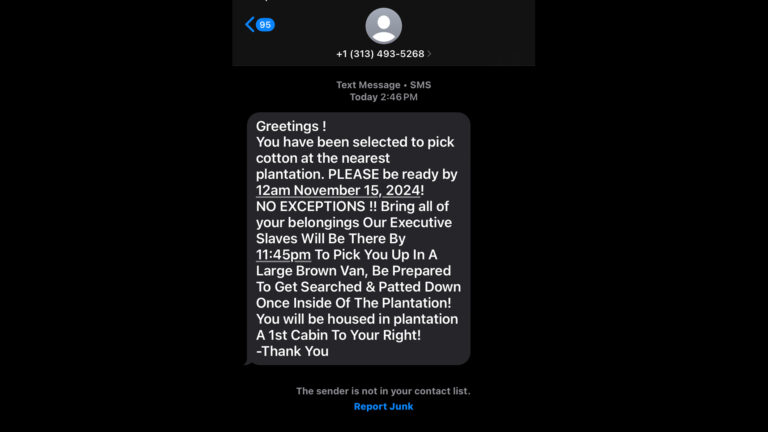US Authorities Investigate Text Messages Promoting Black Enslavement
Investigating Racist Text Messaging: A Dark Chapter in Digital Communication
In our hyper-connected digital age, communication has evolved at lightning speed. With just a few taps on our smartphones, we can connect with people from all over the globe. But, as with all powerful tools, there’s a darker side to this convenience. Recently, US authorities launched an investigation into a disturbing trend: text messages that promote the enslavement of Black individuals. This investigation not only highlights the depths of racial hatred and ignorance but also raises critical questions about responsibility, accountability, and the role of technology in modern society.
A Startling Revelation
In November 2024, reports surfaced of a wave of text messages that shockingly glorified the enslavement of Black people. While some might dismiss these messages as fringe conversations from a few misled individuals, the sheer volume of the messages alarmed authorities. This wasn’t an isolated incident; it reflected a broader undercurrent of racism still permeating society. The FBI and other law enforcement agencies quickly took notice, launching a probe into these communications.
What motivated these messages? What drives individuals to not only harbor these views but to promote them openly, even in the seemingly private realm of text messaging?
The Power of Words and Technology
Words have always held power. They can uplift, inspire, and unite, but they can also wound deeply and promote hatred. Text messaging, while often viewed as a casual form of communication, can amplify messages far beyond their initial audience. A single hateful message can be forwarded, shared, and twisted, reaching individuals who might never have encountered such vile sentiments in their daily lives.
In this age of technology, how do we draw the line between free speech and hate speech? Where should society place accountability? These are complex questions that require careful navigation as we strive for a more respectful dialogue.
Understanding the Context
As we dive deeper into this issue, it’s crucial to understand the historical and socio-political context surrounding it. Enslavement is not a relic of the past—it’s an ongoing conversation rooted in systemic racism, prejudice, and social injustice. The memories of the horrors faced by enslaved individuals remain deeply engrained in society’s collective consciousness.
When these messages circulate, they don’t just affront the dignity of those directly affected. They re-open old wounds, reminding marginalized communities of their painful history and present struggles against racial discrimination. These texts, in essence, function as a dangerous reminder of how deep-seated racism still navigates contemporary communication.
The Role of Social Platforms
As we consider the implications of hateful content, we must examine the responsibility of social media platforms and messaging services. With the rise of encrypted messaging apps, the line between private communication and public accountability has grown increasingly blurred. These platforms provide a shield for individuals to express opinions they might not voice publicly but can share with like-minded individuals without fear of repercussion.
But what happens when that harmful rhetoric leads to real-world consequences? When individuals act upon these messages, perpetuating cycles of violence and discrimination? This raises critical questions about the ethical responsibilities of tech companies:
- Should they monitor conversations that happen on their platforms?
- How do they balance user privacy with the need to prevent hate speech and violence?
Law Enforcement’s Response
In response to this wave of problematic messaging, the FBI and other agencies are stepping up. They are not only investigating the origin of these messages but are also working to dismantle the networks that promote hate. But can law enforcement keep up with the rapid pace of digital communication?
The challenge is considerable. While some might see this investigation as merely a response to fringe opinions, it reflects a larger societal issue. The internet has always provided a platform for hate groups, and these messages are symptoms of a deeper illness—one that requires comprehensive solutions.
Community Engagement and Educating the Masses
It’s vital for communities to unite against this trend. Grassroots movements, community organizations, and educators must collaborate to promote awareness and understanding. Overall, education serves as the cornerstone of combating racism.
- Workshops and Discussions: Hosting community workshops and discussions can facilitate understanding and dialogue between diverse groups.
- School Programs: Educational programs that inform young people about the history of racism, enslavement, and their implications can foster a more inclusive mindset from an early age.
- Digital Literacy Initiatives: Teaching digital literacy not only empowers individuals to critically analyze the information they consume but also helps them navigate and challenge harmful narratives they may encounter online.
The Future of Conversations
As society moves forward, how do we ensure that conversations about race and justice recognize historical injustices while striving for a more equitable future?
One of the most crucial steps is fostering spaces where people can discuss sensitive issues candidly without fear of backlash. These conversations can embolden individuals to reject hate and promote understanding. And as technology continues to evolve, so too should our approaches toward addressing hate and intolerance. This might mean advocating for stricter policies on social media platforms or comprehensively understanding how language shapes our reality.
Building an Allyship Framework
A significant part of this endeavor requires building allyship frameworks in our communities. When we foster supportive relationships across racial lines, everyone emerges stronger. This involves:
- Active Listening: Taking the time to genuinely hear and understand the experiences of marginalized communities.
- Engaging in Difficult Conversations: Embracing discomfort and tackling hard topics, even when they feel awkward or challenging.
- Participating in Advocacy: Supporting policies that promote equity and challenge hate speech in all forms.
Conclusion
The emergence of text messages promoting the enslavement of Black individuals signals a troubling trend in our society—a reminder that while technology connects us, it can also propagate misinformation and hatred. As we grapple with these issues, it is essential to engage in open conversations, promote education, and encourage community solidarity.
To move forward effectively, we need to acknowledge our history, listen actively, and cultivate an environment that prioritizes understanding over division. Only then can we build a society where love, respect, and dignity triumph over hate.
FAQs
-
What prompted the investigation into texts promoting enslavement?
- The investigation arose from reports of a significant number of text messages that glorified the enslavement of Black individuals, alarming authorities and prompting further inquiry.
-
How can communities respond to hate messages?
- Communities can combat hate messages by hosting workshops, engaging in open discussions, and promoting educational programs centered around historical injustices and inclusivity.
-
What role do technology companies play in preventing hate speech?
- Technology companies hold the responsibility to monitor communications and create policies that prevent hate speech while balancing user privacy and free speech rights.
-
Why is education important in fighting racism?
- Education fosters awareness and understanding of historical contexts, empowering individuals to challenge harmful beliefs and promote an inclusive environment.
-
How can individuals help combat racism in their daily lives?
- Individuals can combat racism by actively listening, engaging in difficult conversations, advocating for equitable policies, and supporting marginalized communities through allyship.







